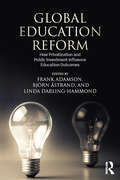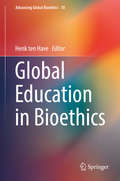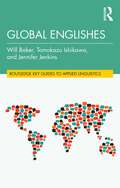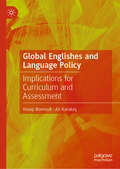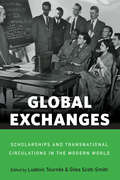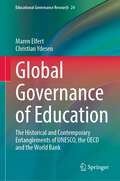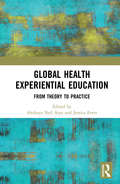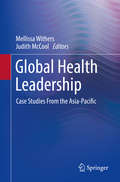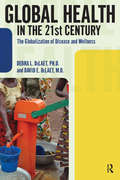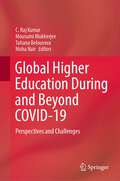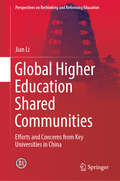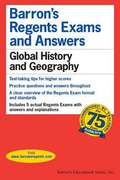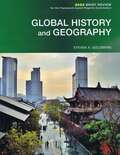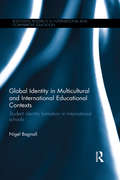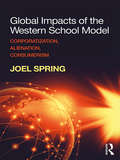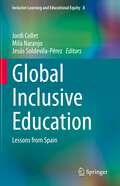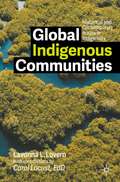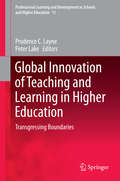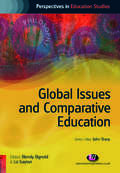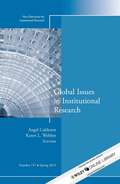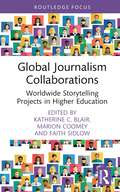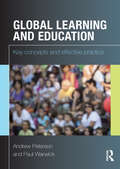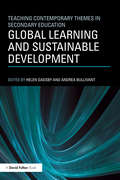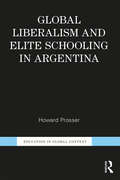- Table View
- List View
Global Education Reform: How Privatization and Public Investment Influence Education Outcomes
by Frank Adamson, Björn Åstrand, and Linda Darling-HammondWith contributions from Linda Darling-Hammond, Michael Fullan, Pasi Sahlberg, and Martin Carnoy, Global Education Reform is an eye-opening analysis of national educational reforms and the types of high-achieving systems needed to serve all students equitably. The collection documents the ideologically and educationally distinctive approaches countries around the world have taken to structuring their education systems. Focusing on three pairs of case studies written by internationally acclaimed experts, the book provides a powerful analysis of the different ends of an ideological spectrum----from strong state investments in public education to market-based approaches. An introductory chapter offers an overview of the theories guiding both neoliberal reforms such as those implemented in Chile, Sweden and the United States with efforts to build strong and equitable public education systems as exemplified by Cuba, Finland and Canada. The pairs of case studies that follow examine the historical evolution of education within an individual country and compare and contrast national educational outcomes. A concluding chapter dissects the educational outcomes of the differing economic and governance approaches, as well as the policy implications.
Global Education in Bioethics: Challenges In Global Bioethics (Advancing Global Bioethics #10)
by Henk Ten HaveThis book presents and elaborates on how the teaching of global ethics in healthcare contributes to furthering ideals of cosmopolitanism: solidarity, equality, respect for differences and concern with what human beings, and specifically patients have in common, regardless of where they live and who they are. Global problems such as pandemic diseases, disasters, lack of care and medication, homelessness and displacement call for global responses. The new area of global bioethics is providing answers by arguing that ethical discourse should first of all criticize the structures of violence and injustice that underlie many threats to global health. Education of health professionals should articulate that they are ‘citizens of the world’, like their patients. This book first demonstrates that a moral vision of global education is necessary to gain a global dimension. It is argued that a global framework of ethical principles is available; the challenge is to elaborate and specify that framework into specific educational approaches and models. The book subsequently analyzes goals and challenges of global education in biomedicine and healthcare. It is shown how such challenges (e.g. inequities and cultural differences) can be overcome. Finally, the book presents concrete examples (cases, methods, and practices) of global education in bioethics. The unique feature of the book is that it addresses global education challenges specifically in the area of healthcare, medicine, and medical science. It combines two areas of research and experience that are usually not connected: global bioethics and global education. This book is written for all those involved in global ethics teaching in medicine, nursing, ethics, philosophy, law, and theology courses.
Global Englishes (Routledge Key Guides to Applied Linguistics)
by Jennifer Jenkins Will Baker Tomokazu IshikawaThe global spread of English, with over two billion users of the language, is now well-documented. English functions as a language of education, business, tourism, and intercultural communication in many settings across the world. Global Englishes offers a clear and comprehensive overview of key areas of the topic, encompassing both World Englishes and English as a Lingua Franca (ELF) within a single volume.This engaging textbook offers readers the opportunity to reflect on key debates as well as develop their own thinking on real-world language practices and problems in light of Global Englishes theory and research. Organised into a three-part Survey, followed by readings from important texts, this is both an introductory textbook covering key concepts and themes, and a starting point for further study. It is essential reading for students of Global/World Englishes and ELF in applied linguistics, sociolinguistics, English language teaching, and intercultural communication.
Global Englishes and Language Policy: Implications for Curriculum and Assessment
by Ali Karakaş Yusop BoonsukThis book provides a comprehensive exploration of the pedagogical implications of Global Englishes for language policy, curriculum design, and assessment. Drawing on current research and practice, the book offers practical guidance for language teachers and curriculum designers, examining the relationship between language policy and curriculum design, and highlighting the importance of assessment in the context of Global Englishes. Over the past few decades, English has emerged as a global lingua franca, used by speakers from diverse linguistic and cultural backgrounds to communicate with one another. However, many English language teachers and curriculum designers are still grappling with the practical implications of Global Englishes. This book addresses this gap and will be an essential resource for language teachers, as well as students and scholars in areas including Language Education, Applied Linguistics, TESOL and English Language Teaching.
Global Exchanges: Scholarships and Transnational Circulations in the Modern World
by Giles Scott-Smith Ludovic TournèsExchanges between different cultures and institutions of learning have taken place for centuries, but it was only in the twentieth century that such efforts evolved into formal programs that received focused attention from nation-states, empires and international organizations. Global Exchanges provides a wide-ranging overview of this underresearched topic, examining the scope, scale and evolution of organized exchanges around the globe through the twentieth century. In doing so it dramatically reveals the true extent of organized exchange and its essential contribution for knowledge transfer, cultural interchange, and the formation of global networks so often taken for granted today.
Global Governance of Education: The Historical and Contemporary Entanglements of UNESCO, the OECD and the World Bank (Educational Governance Research #24)
by Maren Elfert Christian YdesenThis book examines the educational role of three international organizations created as part of the post-World War II multilateral architecture: the United Nations Educational, Scientific and Cultural Organization (UNESCO), the World Bank, and the Organisation for Economic Co-operation and Development (OECD). These organizations have significantly promoted and shaped education as a fundamental feature of the modernization of society and contributed to the globalization of educational norms, policies and technologies. Drawing on primary source materials and interviews, the book provides novel perspectives to the literature on the global governance of education by focusing on the historical entanglements, relations and power struggles between these three organizations, rather than treating them separately. The study sheds light on the homogenizing effects of globalized educational policy-making and the shifting power dynamics in the global governance of education.‘This book makes a very distinctive and important contribution to the literature that critically analyses the influence of the global agencies on education globally; it goes beyond the standard discursive analyses of policy texts to also explore the history of those organisations through archival research and in-depth interviews of the key personnel. What emerges is a powerful analysis which locates those agencies within their historical epochs and shines a light on their tensions and micro-politics, both internally and between organisations.’ Paul Morris, Professor of Comparative Education, Institute of Education, University College London, UK‘A must-read historical account of the intermingling, boundary setting and competition between the three big intergovernmental organizations (IOs) in education: OECD, UNESCO, and the World Bank. Different from other scholars that document how these IOs have transformed themselves in response to external and internal changes, Elfert and Ydesen draw attention to the relational aspect: how have these three IOs navigated conflict, carved niches, and used and abused each other to amplify and expand their own mission? How have they done so in an environment that is crowded with intergovernmental and international organizations, each with a claim to govern education globally?’Gita Steiner-Khamsi, Professor of Comparative and International Education, Teachers College, Columbia University; UNESCO Chair of Comparative Education Policy of the Geneva Graduate Institute of International and Development Studies'This volume is a thoughtful and timely work of scholarship. Understanding the roles of UNESCO, the OECD and the World Bank is central to understanding contemporary education in global perspective. Elfert and Ydesen’s historical analysis sets out in rigorous detail how these organisations have evolved, and what has shaped and driven this evolution. The historical analysis is complemented by contemporary interview data, facilitating an actor-level analysis as well as a broader picture. The book is conceptually and theoretically rich while being accessibly written; the authors manage complexity remarkably well. For anyone interested in global governance and the role of international organisations, or anyone who wants to understand in general how global educational agendas have developed and converged, this book is a most valuable read.' Michele Schweisfurth, Professor of Comparative and International Education, University of Glasgow, UKChapter "UNESCO, the OECD and the World Bank: A Global Governance Perspective” is available open access under a Creative Commons Attribution 4.0 International License via link.springer.com.
Global Health Experiential Education: From Theory to Practice
by Akshaya Neil Arya Jessica EvertThis book presents best practices for ethical and safe international health elective experiences for trainees and the educational competencies and evaluation techniques that make them valuable. It includes commentaries, discussions and descriptions of new global health education guidelines, reviews of the literature, as well as research. Uniquely, it will include ground-breaking research on perspectives of partners in the Global South whose voices are often unheard, student perspectives and critical discussions of the historical foundations and power dynamics inherent in international medical work. Global Health Experiential Education is a timely book that will be of interest to academic directors of global health programmes and anyone involved in training and international exchanges across North America.
Global Health Leadership: Case Studies From the Asia-Pacific
by Mellissa Withers Judith McCoolThis timely book serves as an overview of the challenges in global health leadership from multiple perspectives, bringing together an interdisciplinary group of academics, researchers, and leaders from around the world who are conducting innovative and high-quality research in the field of global health (GH). The book helps illustrate theoretical and conceptual ideas of leadership using recent examples of GH challenges from the Asia-Pacific region.Leadership is an important element of education and training in GH. Leadership can be demonstrated by many sectors, including local and national government, intergovernmental and non-governmental organizations, multilateral organizations, civil society, and private individuals and corporations. The cases included in this book provide an analysis of the major components to successful efforts in GH, including cooperation, cultural competency, vision, and community ownership.Given that GH practice is typically conducted in team settings with members from various backgrounds, this book provides students, faculty, and professionals in public health and related fields with an opportunity to examine multiple examples of leadership in different contexts. Readers learn how leaders have overcome challenges faced in the operationalization of complex health interventions, foreign policy, and working with key stakeholders and organizations.This book aims to help students to:Identify key trends and issues working in GH contexts;Analyze situations in GH and explain the ways public health, health care, and other organizations can work together or individually to affect the health of a community;Recognize the ways that diversity influences policies, programs, services, and the health of a community;Support diverse perspectives in developing, implementing, and evaluating policies, programs, and services that affect the health of a community;Identify characteristics of GH leaders;Learn about ways to identify and measure success in leadership; andUnderstand the challenges and barriers faced in GH programs and how to overcome those.
Global Health in the 21st Century: The Globalization of Disease and Wellness
by David E. Delaet Debra L. DelaetPerhaps no other public policy issue has greater potential to affect some of the most significant economic, political, social, and ethical changes of the 21st century than global health. In this book, a scholar/physician team authors a comprehensive introduction to global health issues and emphasises the potential of public health intervention to improve the longevity and quality of human life across the globe. The authors have lived and worked in Africa as well as in medically underserved areas of the United States, so they write with firsthand experience and authority. Using themes of interconnectedness, globalisation, and united concern from citizens, this book encourages readers to consider the role that they might play as engaged citizens in taking on the global public health challenges of the 21st century including everything from AIDs and flu to tobacco, obesity, and threats in conflict zones.
Global Higher Education During and Beyond COVID-19: Perspectives and Challenges
by Nisha Nair Mousumi Mukherjee C. Raj Kumar Tatiana BelousovaThis book offers insights into how higher educational institutions and educators have responded to the immense challenges of managing the COVID-19 pandemic. Written by global experts in the field of higher education, it offers a multidimensional overview of the digital transformation, governance, and social justice issues within higher education institutions during the pandemic. It provides theoretical insights and conceptual analysis of the emerging trends in global higher education, the challenges, and possible ways to address them to shape more sustainable, qualitative, and socially equitable higher education for future generations. The book appeals to academics and students engaged in the education community.
Global Higher Education Shared Communities: Efforts and Concerns from Key Universities in China (Perspectives on Rethinking and Reforming Education)
by Jian LiThis book offers an in-depth investigation of the globalization of higher education at Chinese universities and colleges. The proposed “Global Higher Education Shared Community” model reflects the globalization of higher education with Chinese characteristics in terms of its conceptual, practical and strategic dimensions.Generally speaking, the book mainly conceptualizes and constructs a model of the specific type of globalization currently taking place at Chinese universities and colleges. As such, it offers a valuable resource for scholars and researchers who are interested and work in research on globalization in higher education from a comparative perspective; for administrators and stakeholders in Chinese higher education management; and for graduate students who are majoring or minoring in comparative higher education.
Global History and Geography
by Michael J. Romano William Streitwieser Mary MartinThis edition includes the most recent Global Studies/Global History and Geography Regents tests through August 2015. These ever popular guides contain study tips, test-taking strategies, score analysis charts, and other valuable features. They are an ideal source of practice and test preparation. The detailed answer explanations make each exam a practical learning experience.
Global History and Geography: 2020 Brief Review for the Framework-based Regents Examination
by Steven A. GoldbergThis book has been written to help the students review the Global History and Geography Course. The features are: Detailed content review of key concepts and skills, Information on recent global events and international policies, Document-based question practice, Questions for Regents Practice, Strategies and skills the students will need to apply their social studies knowledge to the Regents Examination.
Global Identity in Multicultural and International Educational Contexts: Student identity formation in international schools (Routledge Research in International and Comparative Education)
by Nigel BagnallThe increased movement of people globally has changed the face of national and international schooling. Higher levels of mobility have resulted from both the willing movement of students and their families with a desire to create a better life, and the forced movement of refugee families travelling away from war, famine and other extreme circumstances. This book explores the idea that the complex connections created by the forces of globalisation have led to a diminishing difference between what were once described as international schools and national schools. By examining a selection of responses from students attending international schools in Brazil, the United Kingdom, France, Germany, the Philippines and Switzerland, the book discusses key issues surrounding identity and cosmopolitan senses of belonging. Chapters draw from current literature and recent qualitative research to highlight the concerns that students face within the international school community, including social, psychological, and academic difficulties. The interviews provide a rich and unique body of knowledge, demonstrating how perceptions of identity and belonging are changing, especially with affiliation to a national or a global identity. The notion that international students have become global citizens through their affiliation to a global rather than a national identity exhibits a changing and potentially irreversible trend. Global Identity in Multicultural and International Educational Contexts will be of key interest to researchers, academics and policy makers involved with international schooling and globalised education.
Global Impacts of the Western School Model: Corporatization, Alienation, Consumerism (Sociocultural, Political, and Historical Studies in Education)
by Joel SpringIn this timely analysis of the current state of global educational policies, Joel Spring focuses on the spread of the Western school model and its impact on creating an urban-consumer culture, increasing economic inequalities, contributing to environmental destruction and diminishing compassion and empathy essential for energizing social justice movements. In his signature straightforward, concise style, Spring describes and analyzes the school's role in displacing religious with secular values, promoting nationalism, preparing students to work in global corporations, supporting cultural and linguistic homogeneity, and discusses related goals and effects of anti-globalization movements such as the Alt-right, Anti-fascist groups, radical environmentalism and anarchism. An important addition to Spring’s body of work on global educational policies, this provocative book challenges readers to re-examine what they know about education, globalization and their interconnections.
Global Inclusive Education: Lessons from Spain (Inclusive Learning and Educational Equity #8)
by Jordi Collet Mila Naranjo Jesús Soldevila-PérezThis book addresses issues related to school inclusion from the perspective of systemic inclusion. It focuses on the need to face the challenges of inclusion in education from a broad perspective, including the classroom, the school as an institution, families, and the community. It also pays attention to the full interactions between them. The book demonstrates how inclusion can be carried out in very real, concrete and everyday ways. It also shows how researchers can work hand in hand with the professionals and other stakeholders who are developing their practices day by day. The book draws on a range of research projects of the Spanish and international research groups to provide both rich theoretical frameworks and rigorous research outcomes related to the four dimensions of the systemic inclusion perspective and its necessary networking: classroom, school, families and the community. Most of the chapters take Spain as the case study but, far from being a local book, it uses Spanish analysis to dialogue universally with current main debates and challenges in inclusion, almost 30 years after the Salamanca Statement.
Global Indigenous Communities: Historical and Contemporary Issues in Indigeneity
by Lavonna L. LovernGlobal Indigenous Communities is a wide-ranging examination of global Indigenous communities that continue to suffer from colonization and assimilation issues, including intergenerational trauma. The scholarship is interdisciplinary; it is not easily categorized as sociology, anthropology, ethnography, or philosophy, but cuts across all of these disciplines, as well as Indigenous methodologies. The book not only presents an academic study of Indigenous issues, covering Indigenous community life, religion, the environment, economic matters, education, and healthcare, but also incorporates contributions from Carol Locust, EdD, that reflect on her lifetime of experience in Indigenous education and healthcare. Each studied prism of Indigenous life is revealed to be impacted by the experience of intergenerational trauma that results from continued colonization. Ultimately, this book aims to bridge the communication gap between Western and Indigenous scholarship and readership, artfully combining Indigenous approaches with a traditional academic style.
Global Innovation of Teaching and Learning in Higher Education
by Peter Lake Prudence C. LayneThis book examines current trends in higher education and the Scholarship of Teaching and Learning. It introduces readers to pedagogical strategies that instructors worldwide are using to overcome some of the challenges they face in higher education. To maximize their students' learning, this work argues that institutions are compelled to innovate their policies and instructors must be collaborative and creative in their practices in response to students' growing demands, needs, challenges to their learning, and the shifting terrain of a rapidly globalizing world. The text explores the idiosyncrasies and challenges that drive innovation across particular cultures, disciplines and institutions. It suggests that the responses to these drivers offer some universal and compatible lessons that not only optimize teaching and learning, but also transgress institutional, cultural, and disciplinary boundaries in higher education. The contributors to this collection work in the United States, the United Kingdom, Africa, Asia, Australia, Scandinavia and the Middle East. They represent a broad range of disciplines, fields and institutional types. They teach in varied contexts, durations, delivery modes, and formats, including online, study abroad, blended, accelerated, condensed, intensive and mortar-and-brick settings. Their higher education students are equally as diverse, in age, cultural backgrounds and needs, but willingly lend their voices and experiences to their instructors' study of teaching and learning in their particular contexts. This book harnesses the rich diversities and range our contributors represent and shares the results of their expertise, research, and assessments of some of the most creative and effective ways to improve student learning in the face of stagnant practices, limited resources, and other deficiencies that instructors and students face in higher education.
Global Insights: People & Cultures
by Mounir A. Farah Et Al Thomas O. FlickemaThe intent of Global Insights is to provide global knowledge and understanding by having the peoples of eight different geographical regions speak for themselves about the elements that have shaped their lives and made them the way they are today. The text is divided into eight units--Africa, China, Japan, India, Latin America, the Middle East, the Commonwealth of Independent States, and Europe.
Global Issues and Comparative Education (Perspectives in Education Studies Series)
by John SharpAlmost every Education Studies degree includes an element of comparative education, and this book provides an accessible undergraduate-level introduction to the theme. It begins by defining what is meant by the term ′comparative education′ and examines the benefits of studying it to students, policy makers, educators and academics. The book then takes a largely age-phase approach with a comparative analysis of selected education systems from around the world, including the impact of globalisation.
Global Issues in Institutional Research
by Karen L. Webber Angel CalderoneAll around the world, postsecondary institutions are facing competitive environments, declining resources, and changing societal needs. Institutions are affected by globalization, state and local government needs, economic restructuring, information technology, and student and staff mobility. Institutional researchers have a critical role to play in addressing these issues.In this volume, we have embedded the practice of IR as experienced globally. We brought together a discussion that is delivered from multiple perspectives, but fundamentally one that draws from the collaborative efforts of practitioners across borders. By embedding notions of globalization that affect IR, we can engage readers in broad discussions on where we are coming from and where we are heading.This is the 157th volume of this Jossey-Bass quarterly report series. Always timely and comprehensive, New Directions for Institutional Research provides planners and administrators in all types of academic institutions with guidelines in such areas as resource coordination, information analysis, program evaluation, and institutional management.
Global Journalism Collaborations: Worldwide Storytelling Projects in Higher Education (Routledge Focus on Journalism Studies)
by Katherine C. BlairGlobal Journalism Collaborations offers guidance on detailed ways to create collaborative international projects in the communications and journalism fields – a hot topic in higher education.The chapters are contributed by professors and journalists from around the world. The authors explain, step-by-step, the process of collaborating with students and instructors at universities in dozens of countries in order to produce digital storytelling projects that are streamed worldwide. The book will inspire academics and students in any discipline to develop and create their own collaborative projects by sharing lessons learned through case studies of successful global collaborations.This truly interdisciplinary work will interest scholars and instructors of journalism, media studies, mass communication, higher education and anyone working on collaborative projects across a variety of disciplines.
Global Learning and Education: An introduction
by Andrew Peterson Paul WarwickEducation and Global Citizenship offers a detailed introduction and exploration of educational issues pertaining to "global citizenship". The text encourages a critical and reflective approach, developing students’ understandings of a range of theoretical and practical factors. Fresh and accessible, it covers historical and comparative perspectives and is up to date with developments in scholarship, covering both classic and contemporary issues in global citizenship education. Chapters include case studies of educational research and practice, questions for discussion and annotated further readings, and are supported by online resources. This book: encourages critical thinking, reflective practice, and creative engagement relating to global citizenship education; gives a detailed overview of the field; offers an insight into key themes, issues and debates; provides an introduction, informed by case studies of practice, to the pedagogical basis and needs of developing effective global citizenship education. Education and Global Citizenship will be of great interest to students on undergraduate education studies degrees, and will also appeal to students on postgraduate teacher education and Master level courses, as well as University tutors working on education programmes.
Global Learning and Sustainable Development
by Helen Gadsby Andrea BullivantGlobal learning and sustainable development encompass some of the key ideas and challenges facing the world today: challenges such as climate change, globalization and interdependence. Schools increasingly recognize the role of education in addressing these issues with young people, but exploring global issues across the curriculum requires a considerable amount of time and planning across subjects. This book aims to reduce this workload by providing a clear overview of global learning, its development in policy and what this means for teachers in practice. It outlines the different ways in which global learning can be delivered as a cross-curricular theme, with examples of current activities and practice in schools. Features include: an examination of key influences and debates in this area guidance on how to plan, implement and evaluate change in the curriculum to incorporate global learning the role of Personal Learning and Thinking Skills as a way of exploring global learning and sustainable development ideas from the "global context" of practice in Europe and beyond activity ideas supported by case studies of innovative practice links to other educational agendas, relevant topics and resources. Providing clear guidance on the underpinning theory and policy and drawing upon current initiatives in schools, this book will be of interest to all trainee and practising secondary teachers wanting to help young people engage critically with global issues.
Global Liberalism and Elite Schooling in Argentina (Education in Global Context)
by Howard ProsserA response to Argentina’s shifting political climate, Global Liberalism and Elite Schooling in Argentina reveals how elite schooling encourages the hoarding of educational advantage and reinforces social inequalities. Presenting Buenos Aires’s Caledonian School as part of the growing scholarly discussion on elite education in the Global South, Howard Prosser situates the school’s history in concert with that of the state, the region, and the globe. The book applies new methodologies for the study of elite schools in globalizing circumstances by fusing ethnographic fieldwork with archival research and a wealth of secondary sources. This transdisciplinary approach focuses on the nature of liberalism as a global ideal, positing that eliteness is sustained by an economy with its own culture of value and exchange that, ironically, the scholarship on elites may help perpetuate.
